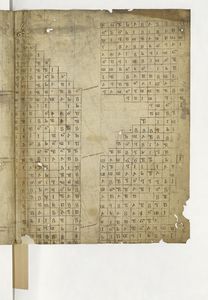Table arithmétique – Fragment
Notes on the numerical tables of Table arithmétique (Fragment), Latin 9377, f. 113[1] in the Bibliothèque nationale de France (Paris).
Description of Fragment
The fragment consists of a single sheet of parchment, folded in half, with numerical tables written on both the left and right sides of the inside (flesh-side) of the parchment.
A fascimile of the pages can be viewed at [1]:
outside (reverse of left side)
outside (reverse of right side)
On the left side are 2 columns, each with 3 tables (and each with a cut off table at the bottom. On the right side are 2 columns each with 1 continuous table.
The Tables
Left Side, Column 1, Table 1
Multiples of 9n (n from 0 to 7) and 17n (n from 8 to 1)
| -1 2 3 4 5 6 7 8 9 transcription factors note |
|---|
| 9 7 5 7 5 7 4 4 1 975757441 178 error: missing leading 6, should be 6975757441 |
| 6 9 3 _ 4 8 _ 5 7 693048057 9 x 177 error: missing leading 3, should be 3693048057 |
| 9 5 5 1 4 3 _ 8 9 955143089 92 x 176 error: missing leading 1, should be 1955143089 |
| 1 3 5 _ 7 5 7 5 3 135075753 93 x 175 error: missing a zero, should be 1035075753 |
| 5 4 7 9 8 1 2 8 1 547981281 94 x 174 |
| 2 9 _ 1 _ 7 7 3 7 290107737 95 x 173 |
| 1 5 3 5 8 6 4 4 9 153586449 96 x 172 |
| _ 8 1 3 1 _ 4 7 3 081310473 97 x 17 SUE OCTO PARTIENT |
- ↑ Note that both "9377" and "113" are prime. Coincidence?
Background
The numbers are "apices" of early Arabic numbers.
in a table from "Histoire de la Mathematique" by J.E. Montucla, published in 1757

